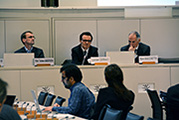MORE:
The WTO is inviting leading technical experts to share their insights with WTO members and the broader trade community on important economic and policy developments. The initial lectures, organized by the WTO’s Economic Research and Statistics Division, are focusing on the latest research regarding trade and labour market effects.
The series is particularly timely. As WTO Deputy Director-General Xiaozhun Yi noted in his welcoming remarks, a “strong rhetoric against trade has gained momentum in a number of economies and the impact of globalization on wages and jobs is mentioned frequently in this context.”
“There is a sense among the broader public that trade experts, economists and politicians have tended to minimize distributional concerns and often put too much emphasis on the gains from trade and too little on the costs of adjustment,” DDG Yi noted. “While there is ample evidence that overall trade generates benefits, it is also clear that these benefits come with adjustments that can involve costly transitions of workers between firms, sectors and/or regions.”
The aim of the WTO policy lectures “is to help balance the debate on trade, with a view to make sure that the right solutions are applied to the problems that have been raised,” DDG Yi continued. “ A clear understanding of how such changes affect labour markets is crucial for designing economic policies that facilitate the adjustment and spread the benefits of trade and technology as widely as possible.”
The first lecture examined adjustment policies already in place to help workers made redundant due to the impact of globalization. Lucian Cernat, Chief Economist with the European Commission’s Directorate-General of Trade, provided an evaluation of the European Globalization Fund, a mechanism established in 2006 to finance trade adjustment programmes in EU member countries. Professor Torben Andersen of Aarhus University reviewed Denmark’s “Flexicurity” programme, which has been cited as a model for combining flexible employment practices with generous adjustment benefits and active labour market policies.
Details on the Trade Dialogues series, including future lectures and registration requirements, are available here.
> Problems viewing this page?
Please contact [email protected] giving details of the operating system and web browser you are using.

